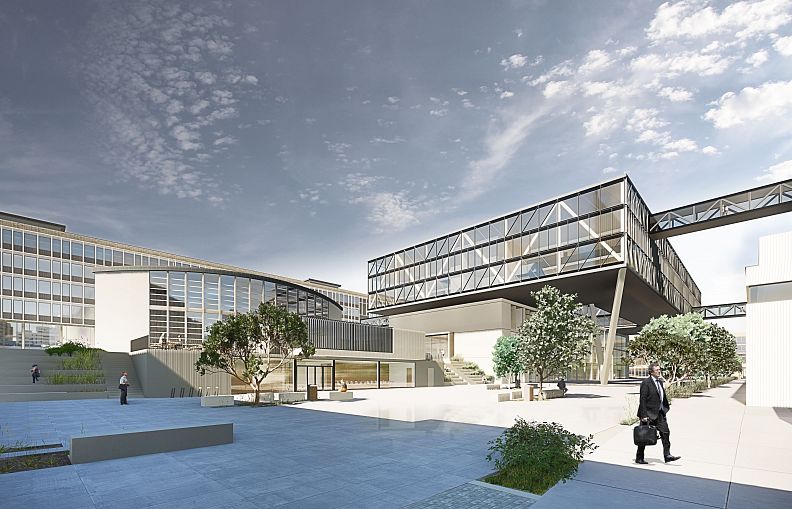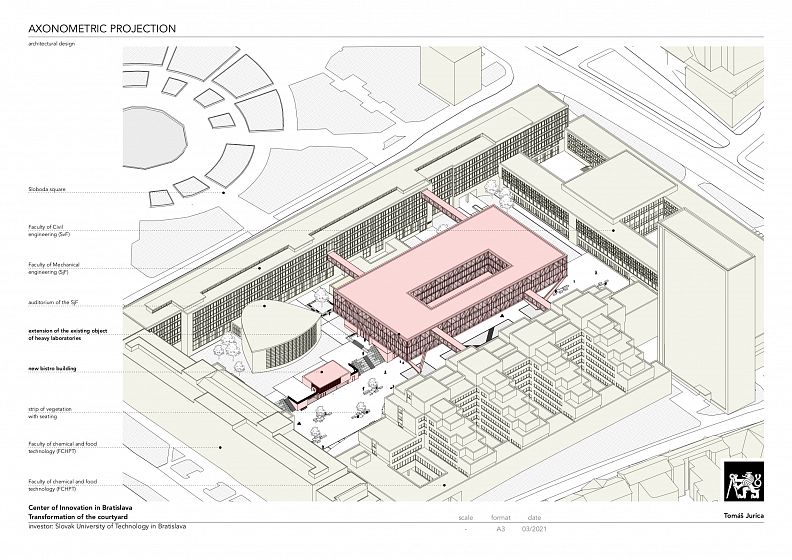Center of Innovation in Bratislava

Project idea
The assignment was to transform the courtyard of the STU campus in Bratislava. The area is located in Bratislava´s (SK) wider center between Radlinského Street and Slobody Square. There was a building of heavy laboratories, which I preserved in my design. The architectural design can be divided into three separate buildings. Object A - Innovation center building, Object B - New bistro building, Object C - entrance to the underground automated parking system.
Project description
Object A:
The existing building of the already mentioned heavy laboratories, which is located on an elongated rectangular plan, according to my proposal a 3-storey extension should be built. The existing building is strictly rectangular in shape and the mass of the extension follows this. The basic mass of the extension is placed on the heavy laboratory building, partly as a pedestal, and further extends over the courtyard, where it is placed on pilasters in a V-shape. The initial idea that survives was to connect the extension to the surrounding buildings using connecting bridges. An open atrium runs through the superstructure, allowing light into the middle of the disposition.
The building is divided into five main functional zones. The first is the study zone, which is partially preserved in the existing building and then in 3rd and 4th floors - as study rooms and media room. Next is the research zone, which is located on the 4th and 5th floors - as offices, laboratories, etc. This zone also includes a science and technology presentation center on the 3rd floor. The third is the catering zone, which is located on the 1st floor and 2nd floor of the existing building of the former heavy laboratories and in the new bistro building. Another zone is the zone for startups, located in 5th floor. The last and no less important is the zone for relaxation in the form of relaxation zones (marked in the floor plans). The main part of the relaxation zones is located in the open corners of the building over two floors.
Object B:
A new bistro building should also be created in the courtyard, which is recessed into the ground and staircases with seating and greenery run around this building. It is also a strictly rectangular building with a simple facade. The 2nd floor has all glass surfaces covered with aluminum lamella blinds.
It consists of two floors - 1st floor (main entrance, toilet, bistro preparation room, lounge) and 2nd floor (bistro area, bar, outdoor seating).
Object C:
The existing courtyard is partially used as a parking lot for employees. Even though this function is practical for the employees aesthetically is no satisfactory. The new parking solution is an underground automated parking system with a capacity of 330 spaces. The parking system is accessed via a solitary entrance building.
Technical information
Object A:
The existing building has a main load-bearing structure made of a reinforced concrete frame. The extension is structurally designed as a steel truss structure, which is supported by the existing building and 2 V-shaped steel-concrete pilasters. A steel frame in the form of vierendeel beams is inserted into the truss structure, on which the slabs are then tensioned in one direction (see Construction Isometrics).
The whole building is designed in raw materials with high durability. The facade of the existing building is to be clad with prefabricated concrete panels. The facade of the extension should be fully glazed with pre-set aluminum slats, which partly function as sunshade. Doors and windows will be made of aluminum profiles.
Object B:
This building is structurally designed as a reinforced concrete wall with a facade of monolithic reinforced concrete, and the insulation of the building is intended as internal. The doors and windows will be made of aluminum profiles.
Object C:
Materially, it is a simple block with one facade articulated to evoke a gate. This object is located next to the FCHPT building.









